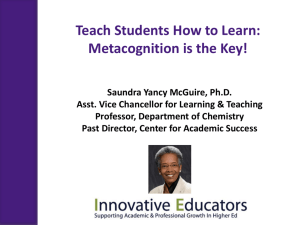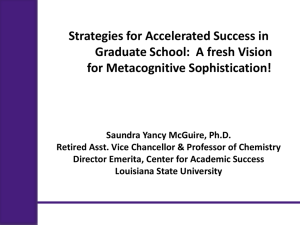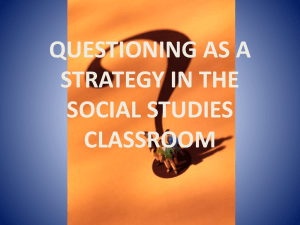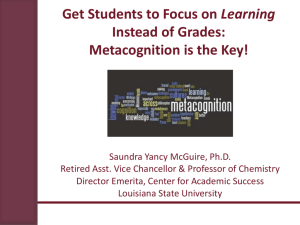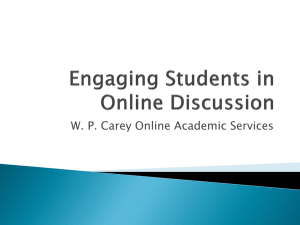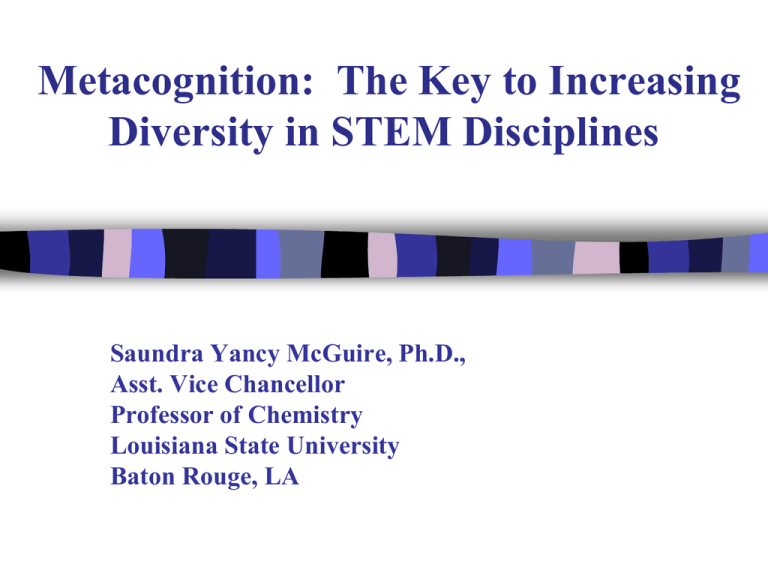
Metacognition: The Key to Increasing
Diversity in STEM Disciplines
Saundra Yancy McGuire, Ph.D.,
Asst. Vice Chancellor
Professor of Chemistry
Louisiana State University
Baton Rouge, LA
Barriers to Minority Student Success
Usually Less Prepared
Few Role Models in Community
Family Pressures
Lack of Community of Peers on Campus
Stereotype Threat
The Barriers CAN Be Overcome…
by using appropriate strategies
Dana, first year physics student
80, 54, 91, 97, 90 (final)
Problem: Memorizing formulas and using
www.cramster.com
Solution: Solve problems with no external
aids and test mastery of concepts
LSU Analytical Chemistry Graduate Student’s
Cumulative Exam Record
2004 – 2005
2005 – 2006
9/04
Failed
10/05
Passed
10/04
Failed
11/05
Failed
11/04
Failed
12/05
Passed best in group
12/04
Failed
1/06
Passed
1/05
Passed
2/06
Passed
2/05
Failed
3/06
Failed
3/05
Failed
4/06
Passed last one!
4/05
Failed
5/06
N/A
Began work
with CAS and
the Writing
Center in
October 2005
Dr. Algernon Kelley, December 2009
From a Xavier University student to Dr. Kelley in Fall 2011
Oct. 17, 2011
Hello Dr. Kelley. … I am struggling at Xavier and I REALLY want to succeed,
but everything I've tried seems to end with a "decent" grade. I’m not the type of
person that settles for decent. What you preached during the time you were in Dr.
Privett's class last week is still ringing in my head. I really want to know how you
were able to do really well even despite your circumstances growing up. I was
hoping you could mentor me and guide me down the path that will help me realize
my true potential while here at Xavier. Honestly I want to do what you did, but I
seriously can't find a way how to. Can I please set up a meeting with you as soon
as you’re available so I can learn how to get a handle grades and classes?
Oct. 24, 2011
Hey Dr. Kelley, I made an 84 on my chemistry exam (compared to the 56 on my
first one) using your method for 2 days (without prior intense studying). Thanks
for pointing me in the right direction. I’ll come by your office Friday and talk to
you about the test.
Nov 3, 2011
Hey Dr. Kelley! I have increased my Bio exam grade from a 76% to a 91.5% using
your system. Ever since I started your study cycle program, my grades have
significantly improved. I have honestly gained a sense of hope and confidence here
at Xavier. My family and I are really grateful that you have taken time to get me
back on track.
LA-STEM
RESEARCH
SCHOLARS
PROGRAM
Louisiana State University
213 Hatcher Hall
Office of Strategic Initiatives
MISSION & VISION
To increase diversity in STEM areas at the undergraduate and
graduate levels
To provide a supportive and motivating environment for students
which promotes academic success through mentoring, education,
and research
Office of Office
Strategic
InitiativesInitiatives
of Strategic
Success through…..
Mentoring
Education
LA-STEM Research Scholars:
Receive preparation for research as freshmen
Begin working in a research lab by their sophomore year
Choose a research mentor to offer guidance and support
Participate in summer research programs nationwide
and internationally
Have the option to select a major research project and write a
senior thesis
Office of Office
Strategic
InitiativesInitiatives
of Strategic
Research
LA-STEM SCHOLARS
Percentage of total Scholars Served by
Ethnicity &Gender: 2003-2011
Females
Males
60
50
40
30
20
10
0
American
American Asian/Pacific
Asian/Pacific
Islander
Indian
Indian
Islander
Black
Black
Hispanic
Hispanic
SIX-YEAR GRADUATION RATES
Office of Office
Strategic
InitiativesInitiatives
of Strategic
IN
White
White
STEM
*LA-STEM
Research
Scholars
Program
Highly
Selective
Institutions
Louisiana
State
University
Selective
Institutions
Moderately
Selective
Institutions
All
92.3%
49.6%
34.4%
37.6%
28.0%
Male
96.0%
50.0%
38.4%
39.2%
28.5%
Female
90.2%
46.7%
29.0%
34.6%
27.2%
Black
92.3%
33.0%
26.7%
24.6%
12.5%
Success through…..
Mentoring
Education
Scholars receive tools for success in
undergraduate & graduate school:
Differences between high school and college
Refined problem-solving skills
Time management and organization
Enhanced interdisciplinary learning
Professional skills
Metacognitive abilities
Writing skills
Presentation skills
Graduate school preparation
Office of Office
Strategic
InitiativesInitiatives
of Strategic
Research
Metacognition
The ability to:
think about thinking
be consciously aware of oneself as a
problem solver
monitor and control one’s mental
processing (e.g. “Am I understanding
this material?”)
accurately judge one’s level of learning
Effective Metacognitive Strategies
Always ask why, how, and what if
Use SQ5R for reading assignments
(survey, question, read, recite, review, wRite, reflect)
Test understanding by giving “mini lectures” on
concepts
Move higher on Bloom’s taxonomy
Always solve problems without looking at an
example or the solution
Use the Study Cycle with Intense Study Sessions
Bloom’s Taxonomy
Anderson & Krathwohl, 2001
http://projects.coe.uga.edu/epltt/index.php?title=Bloom's_Taxonomy
This pyramid depicts the different levels of thinking we use when learning.
Notice how each level builds on the foundation that precedes it. It is
required that we learn the lower levels before we can effectively use the
skills above.
Creating
Making judgments based on
criteria and standards through
checking and critiquing.
Evaluating
Applying
Understanding
Retrieving, recognizing,
and recalling relevant
knowledge from
long-term memory.
Constructing meaning from
oral, written, and graphic
messages through
interpreting, exemplifying,
classifying, summarizing,
inferring, comparing, and
explaining.
High School
Carrying out or using a
procedure through executing,
or implementing.
Breaking material into
constituent parts,
determining how the
parts relate to one
another and to an
overall structure .
Undergraduate
Analyzing
Putting elements together to
form a coherent or functional
whole; reorganizing elements
into a new pattern or structure
through generating,
planning, or producing.
Graduate School
Bloom’s
Taxonomy
Remembering
http://www.odu.edu/educ/llschult/blooms_taxonomy.htm
At what level of Bloom’s did you have to
operate to make A’s or B’s in high school?
1.
2.
3.
4.
5.
6.
Knowledge
Comprehension
Application
Analysis
Synthesis
Evaluation
35%
25%
21%
13%
1
2
3
4
3%
3%
5
6
At what level of Bloom’s do you think you’ll
need to be to make an A in Chem 1201?
1.
2.
3.
4.
5.
6.
Knowledge
Comprehension
Application
Analysis
Synthesis
Evaluation
35%
23%
15%
14%
7%
6%
1
2
3
4
5
6
Knowledge of Research on Metacognition
and Mindset Greatly Increases
Minority Student Success
• They
are less likely to have been cognitively
challenged in high school
•They are less likely to be encouraged to persist
in their pursuit of a degree
•They are more likely to fall victim to
stereotype threat
•They are more likely to experience the
impact of a paradigm shift
Gabriel, Kathleen F. (2008) Teaching Unprepared Students.
Sterling, VA: Stylus Publishing
Effective Strategies for
Teaching Unprepared Students*
Establish high expectations
Emphasize Consistent Contact
Determine Students’ Learning Styles
Define Student Success
Clarify Student Responsibility
Establish a Learning Community of Scholars
Meet Students Where They Are
Interweave Assessment and Teaching
*Kathleen Gabriel, Stylus Publishing, 2008
We can significantly increase
minority student success
We must help students overcome
stereotype threat
We must introduce them to successful
students who can serve as role models
We must teach students the learning
process and specific strategies
We must not judge student potential on
initial performance
We must encourage students to persist in
the face of initial failure
Useful Websites
www.cas.lsu.edu
www.howtostudy.org
www.vark-learn.com
www.drearlbloch.com
Searches on www.google.com
Additional References
Bruer, John T. , 2000. Schools For Thought: A Science of Learning in the
Classroom. MIT Press.
Bransford, J.D., Brown, A.L., Cocking, R.R. (Eds.), 2000. How people
learn: Brain, Mind, Experience, and School. Washington, DC: National
Academy Press.
Cromley, Jennifer, 2000. Learning to Think, Learning to Learn: What the
Science of Thinking and Learning Has to Offer Adult Education.
Washington, DC: National Institute for Literacy.
Ellis, David, 2006. Becoming a Master Student*. New York: HoughtonMifflin.
McGuire, Saundra, 2004. Teaching Your Students HOW to Learn
Chemistry. In D. Bunce and C. Muzzi (Eds.), Survival Handbook for the
New Chemistry Instructor. Upper Saddle River, NJ: Pearson Prentice
Hall.
Nilson, Linda, 2004. Teaching at It’s Best: A Research-Based Resource
for College Instructors. Bolton, MA: Anker Publishing Company.
Pierce, William, 2004. Metacognition: Study Strategies, Monitoring, and
Motivation.
http://academic.pg.cc.md.us/~wpeirce/MCCCTR/metacognition.htm
*Excellent student reference

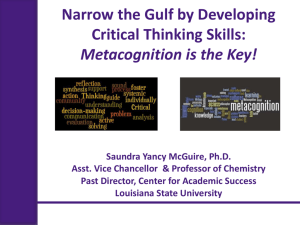
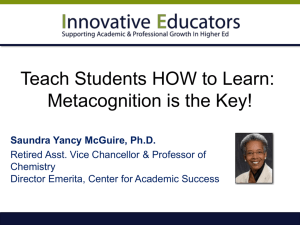
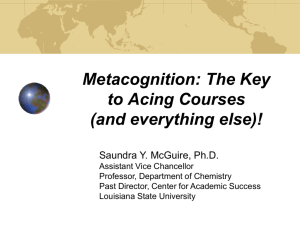
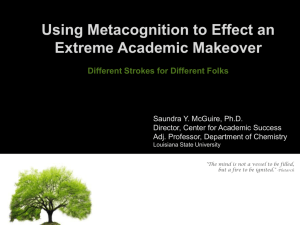
![File [ptx] - Kent State University](http://s3.studylib.net/store/data/009471766_1-c9863c0101d52ef451e19680e4b3f848-300x300.png)
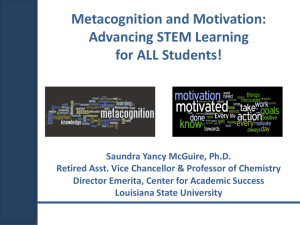
![File [ptx]](http://s3.studylib.net/store/data/009427298_1-8f707a5a5fa6e5d11883ac6bfef16f05-300x300.png)
